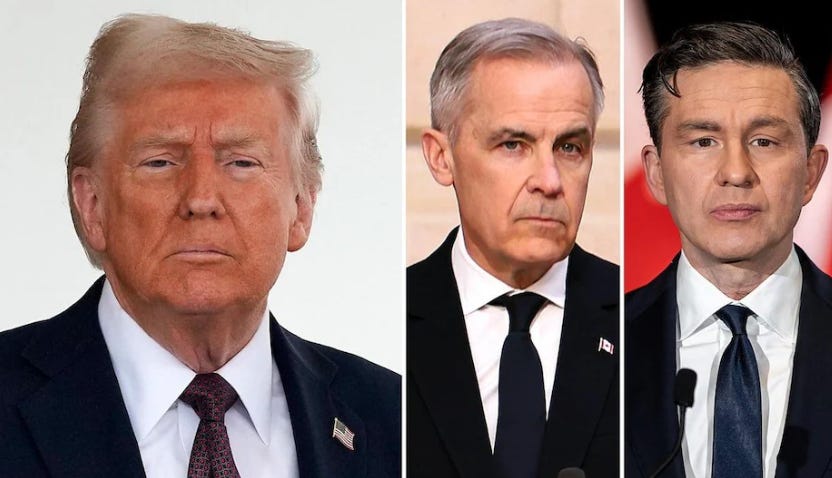Canada and Australia Record Progressive Wins in Elections, PAP Retains Parliamentary Supermajority in Singapore, Trump Reshuffles Cabinet, Vatican Sets Conclave for May 7, and More
Grinfi Political Risk Intelligence Weekly Briefing
Welcome to this week’s edition of Grinfi Political Risk Edge, your trusted source for expert political risk analysis and strategic intelligence. In this issue, we examine key geopolitical events shaping the defense, energy, and DeFi markets, providing a deep, beyond-the-headlines assessment. Anticipate, Adapt, and Excel!
But first, let’s begin the week with a laugh 😄 to brighten the mood.
"There never was a good war or a bad peace."
Benjamin Franklin, Letter to Sir Joseph Banks, July 27, 1783. In The Papers of Benjamin Franklin, vol. 40, edited by Ellen R. Cohn, 368–369. New Haven, CT: Yale University Press, 2011.
Disclaimer: The opinion expressed in this quote does not represent our views but is intended for reflection purposes only.
From Grinfi Political Risk Observatory (GPRO), here’s what we’re monitoring:
High Impact Situational Updates
MAJOR HEADLINES
— The Resurrection of the Left: Did the Trump Effect Backfire?
Make Liberals Great Again!
Is this the ultimate irony manifesting as political reality?
The slogan, now widely repeated in parody of the Trump effect, captures what many across the political spectrum, until recently, would have dismissed as absurd. Yet, paradoxically, Trump has become the very figure the global left needed, rescuing it from what many polls suggested could have been its most tectonic electoral collapse in years. Once assumed to be a global windfall for conservative politics, the Trump brand has instead become an arguably necessary political catalyst for liberal resurgence abroad. Consequently, center-left coalitions are back in power, not despite Trump, but in part because of him.
On April 28, Canada held its 45th federal election, resulting in a victory for the Liberal Party under Prime Minister Mark Carney. The Liberals won 168 seats in the 343-seat House of Commons, falling four seats short of a majority, forming a minority government. The Conservative Party, led by Pierre Poilievre, captured 144 seats but suffered a significant blow as Poilievre lost his Carleton seat in Ottawa, a historic upset.
The election was heavily influenced by U.S. President Donald Trump’s 25% tariff threats and provocative annexation rhetoric, which galvanized Canadian voters and boosted nationalist sentiment. The Liberals garnered 43.7% of the popular vote, their strongest showing since 1980, while the Conservatives achieved 41.3%, their best since 1988. The New Democratic Party (NDP) plummeted to seven seats, and the Green Party secured one. Key campaign issues bordered on the cost of living, housing affordability, crime, and U.S.-Canada trade relations.
Carney, a former Bank of Canada and Bank of England governor, announced a gender-parity cabinet to be formed by May 12, with Parliament scheduled to resume full session on May 27.
On May 2, Carney announced plans to meet with President Trump to address trade tensions and tariff disputes, emphasizing the need for constructive dialogue to protect Canada’s economic interests. The minority government will likely rely on NDP or Bloc Québécois support to pass legislation, posing challenges for economic diversification and trade negotiations amid U.S. pressures.
Help us serve you better and improve Grinfi Political Risk Edge by taking this brief, fully anonymized reader survey.
Australia’s Labor Party Wins Landslide Re-Election
Australia’s federal election on May 3, delivered a decisive victory for the Labor Party, led by current Prime Minister Anthony Albanese, securing a second term with a strengthened majority. Labor won approximately 85 seats in the 150-seat House of Representatives, surpassing the 76 needed for a majority. This marked a significant increase from their 2022 tally of 77. The Liberal-National Coalition, led by Peter Dutton, secured around 41 seats, with Dutton losing his Queensland seat of Dickson, a major setback for the opposition. The election was shaped by economic challenges, including inflation, housing affordability, and global market disruptions from U.S. President Trump’s tariff policies.
Albanese’s campaign emphasized stability, renewable energy investment, and strengthened AUKUS defense ties, resonating with voters amid global uncertainty.
To woo voters, Albanese leveraged anti-Trump rhetoric, criticizing the opposition's Trump-like policies and emphasizing "Australian values" over foreign influence. In his victory speech, he declared, "We do not need to beg or borrow or copy from anywhere else," a veiled swipe at Dutton's campaign, which echoed Trump's rhetoric on immigration and public sector cuts.
This strategy capitalized on voter backlash against Trump's tariffs and global unpredictability, with polls showing that Australians trusted Albanese more than Dutton to handle U.S. relations.
However, the picture wasn’t entirely rosy for the left. A clear distinction emerged in voter preference between the economic left and their more socially inclined counterparts. The Greens lost ground, securing fewer seats, while independents and minor parties, including teal independents, saw reduced influence. Albanese became the first Australian prime minister since John Howard in 2004 to win consecutive terms, reinforcing Labor's dominance.
Singapore’s PAP Retains Parliamentary Supermajority
Singapore’s general election on May 3, saw the ruling People’s Action Party (PAP), led by Prime Minister Lawrence Wong, retain its supermajority in Parliament,









